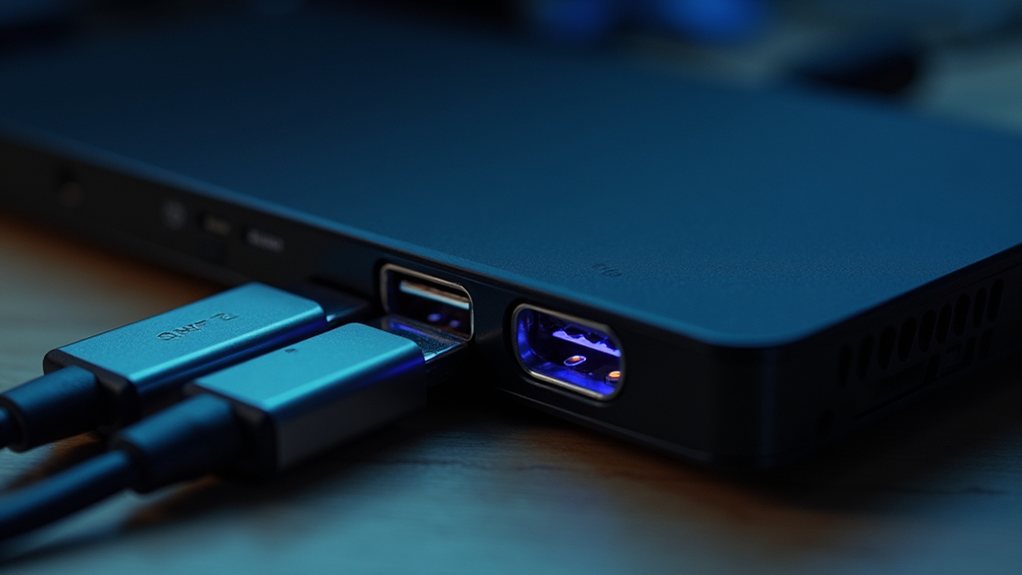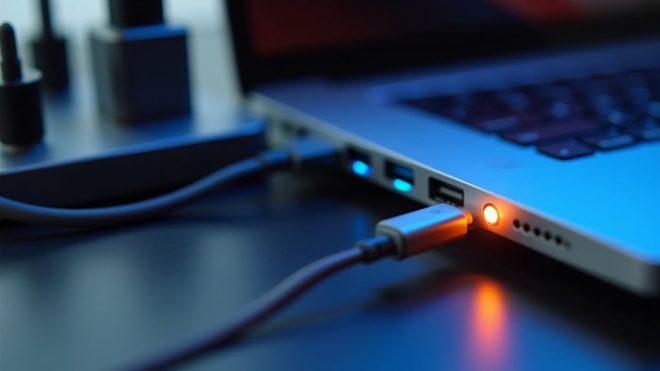Microsoft is pushing OEMs to fix widespread USB Type-C implementation issues that undermine Windows 11’s notification system for power and data connections. Poor firmware configurations and mislabeled ports are causing users to miss critical alerts about charging problems and incompatible accessories. The tech giant’s campaign aims to prevent hardware damage and data loss as it establishes stricter standards for future device compatibility. This proactive approach signals Microsoft’s broader vision for connected computing.

Though USB Type-C ports have become increasingly prevalent in modern devices, Microsoft has taken a significant step forward in Windows 11 by implementing extensive notification systems to help users diagnose and resolve connection issues. The tech giant’s proactive approach aims to prevent hardware damage, data loss, and the frustration of slow charging that many users experience with USB-C connections.
Microsoft’s push for better USB-C notifications has put them on a collision course with OEMs who haven’t properly implemented the necessary firmware configurations. The root of the problem lies in the accurate implementation of ACPI descriptors, particularly the _UPC and _PLD tags that identify USB port capabilities and physical locations. When OEMs mislabel ports or incorrectly configure internal versus external connections, the entire notification system falls flat. Internal devices often remain unaffected when data is disabled through security measures.
Microsoft’s battle with OEMs over USB-C standards reveals how improper firmware configuration can undermine even the most sophisticated notification systems.
The stakes are higher than just user convenience. Improper USB-C implementations can lead to device damage faster than a smartphone battery drains at a music festival. Microsoft’s system is designed to catch these issues early, warning users about everything from underpowered chargers to incompatible accessories. Regular quality assurance testing is crucial for maintaining reliable USB-C functionality. But these safeguards only work when OEMs properly configure their hardware.
Microsoft has been increasingly vocal about the need for manufacturers to step up their game. The company has issued detailed advisories and guidelines, fundamentally telling OEMs to shape up or ship out when it comes to USB-C implementation. They’re recommending thorough testing across various charging and accessory scenarios, emphasising the use of the Windows Hardware Lab Kit to validate port descriptors.
The impact on users is significant. When properly implemented, these notifications serve as an early warning system, preventing the kind of prolonged troubleshooting that can eat up productive hours. They alert users to slow charging that might otherwise go unnoticed, warn of faulty connections before data loss occurs, and flag peripheral issues before they can impact system stability.
For OEMs, the pressure is mounting. Microsoft’s emphasis on proper USB-C notification implementation isn’t just a suggestion – it’s becoming a vital aspect of Windows 11 compatibility. Manufacturers are being urged to incorporate USB-C setting options in their device software, giving users more control over notification preferences.
The push for better USB-C notifications reflects a broader shift in how Microsoft approaches hardware integration. Rather than letting users figure out problems on their own, Windows 11 aims to proactively identify and solve connection issues before they become critical. As USB-C continues its march toward universal adoption, Microsoft’s stance sends a clear message: proper implementation isn’t optional, it’s fundamental for the future of connected computing.
Final Thoughts
Microsoft is advocating for standardized USB-C notifications in Windows 11 to enhance the user experience by providing consistent alerts regarding charging, data transfer, and device connectivity. This initiative aims to reduce confusion and promote a unified Windows ecosystem, benefiting both manufacturers and end users.
Ipswich Computer Repairs can assist your business in implementing these changes effectively, ensuring that your devices align with Microsoft’s standards. Don’t hesitate to reach out for support—click on our contact us page to get in touch today!

